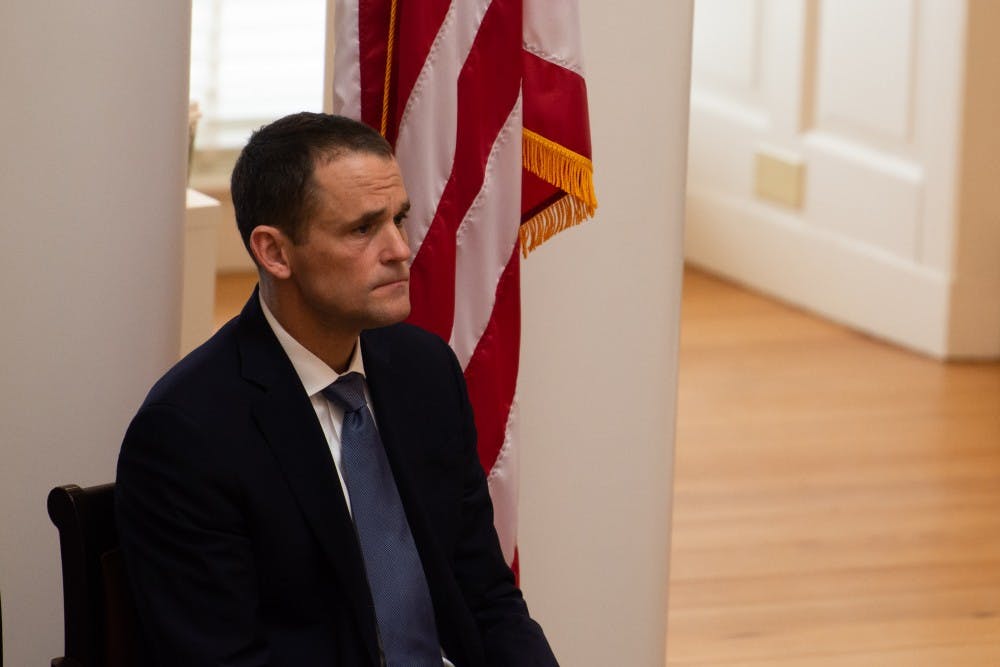University President Jim Ryan got a lot of good press from his inauguration speech.The main takeaway was that the University would be tuition-free for students with household incomes below $80,000, and tuition- and room and board-free for students from a household income of $30,000 or less. The Washington Post presented the news as “UVA president vows free tuition for those making under $80k.” The Cavalier Daily’s headline reads “In-state students from families earning less than $80K will be able to attend U.Va. tuition-free, Ryan announces.” Following the speech, more and more articles lauded the move as a beacon of a progressive, equality-seeking rookie president cutting his teeth as a trailblazer. The announcement of tuition-free college for some and expanded aid for others is ultimately good news because it relieves some of the financial burden for students. However, those praising Ryan shouldn’t conflate him as champion of the students and community member interest groups seeking a more equitable institution.
Currently, the University is run from a top-down perspective with a Board of Visitors that makes key decisions and approves the budget, as well as a president, respective staff and various bodies that represent staff and students. There’s no denying that if the Board of Visitors and the president want to implement massive changes to the University, they can. When discussing these changes, it cannot be overlooked that the budget runs through 17 people who do not attend the University, often do not live in the community and are not elected. This is where much of the power of the University lies.
Understanding Ryan’s role in the University should involve skepticism precisely because he has immense power . Although his control of the University is not singular, his role is to set the agenda for the University and implement the agreed upon vision — he therefore has both formal power and considerable influence. While Ryan may personally be an incredibly pleasant, progressive person, the product of him representing an institution that increasingly engulfs a city and hoards a nearly ten billion dollar endowment places him at odds with those who would wield the University’s resources in different ways.
Tuition is a good policy to evaluate when looking at Ryan’s role in the University because it’s an issue that in one way or another impacts nearly every student. It’s possible to look at his tuition announcement in multiple ways. One is that it’s an example of Ryan’s commitment to improving the University’s accessibility. Another, more cynical view, is that it’s a move meant to reshape public perception of the University following a few tumultuous years and to keep pace with other “elite” institutions. Reading Ryan through the former lens can mislead students and community members into thinking that appealing to his moral sensibilities is all it will take to enact much needed reforms. However, even if Ryan has a genuine desire for positive change, understanding him through the latter, more critical lens, as a representative meant to propagate the University’s greatness, gives insight into past and future campaigns as they relate to the University.
Why is it that Ryan has put together a working group to look into being a good neighbor, but is lukewarm in response to the University’s role in Charlottesville’s housing crisis and soaring healthcare costs? How about the fight for a living wage that’s been going on for years at the University? If we look through the latter lens, where his role is to protect the financial interests of the University, then it should come as no surprise that he sidestepped the question of raising wages in an interview with the Cavalier Daily.
Like the recent tuition announcement, the demands that aimed at the University require little to no material sacrifice. The recent aid announcement turned out to not be that different from the University’s current aid programs. To enact real reforms that question the power of the University — composition of students, staff, role in community and financial control — is directly at odds with the preservation of the University as either elite, profitable or both. Put simply, there is almost certainly no conversation, no matter how thoughtful, that would lead to Ryan announcing that some of the University’s $10 billion endowment will be used to pay reparations to the Charlottesville community for the University’s role in soaring housing costs and gentrification.
This should not be construed to mean that nothing will ever change, or that change will only ever come through the sheer luck of occasionally benevolent elites and changing times. Rather, it should lead those who want a better University to analyze where and when broad coalitions can form and exert pressure on institutions to extract concessions. The University existing as an inequitable institution now doesn’t guarantee it must remain that way in the future. When pushing for a better University, it’s best to keep in mind that even if President Ryan doesn’t need to be treated as adversarial, he’s on a different side than the community that the University should be serving.
Jake Wartel is an Opinion Columnist for The Cavalier Daily. He can be reached at opinion@cavalierdaily.com.





